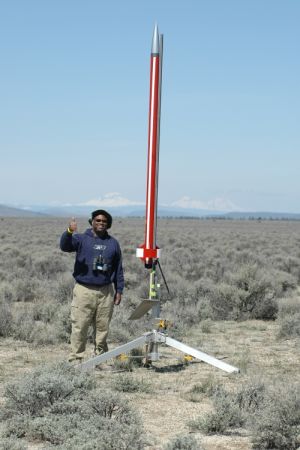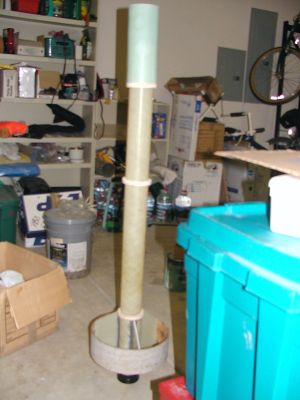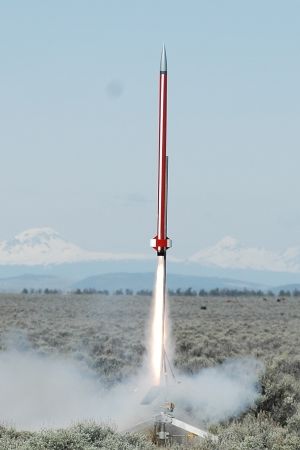Scratch Galadriel Original Design / Scratch Built
Scratch - Galadriel {Scratch}
Contributed by Jack Caynon
| Manufacturer: | Scratch |

Brief:
Galadriel is my TRA Level 3 Certification Rocket and is named for the elf queen
in the Lord of the Rings. The goals of the Galadriel project include:
- A successful L3 Certification Flight on a 75mm M impulse motor,
- The use of a novel fin design for stability and aesthetic purposes, and
- The construction of an airframe for future flights using K, L, and M impulse motors.
Galadriel is an upscale of Andrew MacMillen's Nebulizer (RockSim) 2.6 inch body tube/4 inch ring fin Ratt H70 hybrid motor powered rocket. Overall, Galadriel is 113 inches from the nose to the Aero Pack motor retainer cone and just over 4 inches in diameter with an 11.4 inch diameter ring fin. She is designed to fly with high thrust K, L, and baby M motors. Its weight (empty) is 17 lbs.
Construction:
The rocket has an Aero Pack Tail Cone 75 mm motor retainer for motor retention.
The airframe is fiberglass tubing and the motor mount tube is Hawk Mountain
75mm fiberglass tubing. Galadriel has an 8 inch altimeter bay between the fore
and aft recovery bays. There were no anticipated issues with this particular
rocket, the ring fin configuration used for this rocket is a proven stable
design that provides an excellent CG/CP relationship with plenty of room for
recovery systems and altimeters. It offers a stable design with good flight
characteristics.
The recovery system is the drogue-to-main style with a design similar to most of my other rockets. The altimeter coupler is in the middle of the stack with the drogue chute in the recovery bay below and the main in the recovery bay above the altimeter coupler. Both recovery bays are bolted to the altimeter coupler.
With a maximum launch weight of 22lbs, standard Blacksky rail guides are sufficient. Three rail guides are screwed through the airframe into the plywood centering rings around the motor mount tube in the motor section. A rail length of 8' is required on a suitable launch pad.
Galadriel was fairly easy to build, the only "gotcha" was fashioning an altimeter bay for a 4 inch bird that could hold two altimeters in Public Missiles' CPR 3000 mode. If I were to construct another version of this rocket, I would prepare a more conventional altimeter bay which could hold two altimeters.
The airframe tubes are four sections of 4 inch fiberglass tubing. The altimeter bay is 4 inch fiberglass coupler tubing with a small, 2 inch piece of airframe tubing to join the main chute section and the drogue sections of the airframe.
Although I've included the RockSim file for Galadriel, if you'd like to design your own ring fin rocket, here is the technique you need to use in Rocksim to achieve the proper results. Bruce Levison developed a ring fin simulation method for RockSim to calculate the CP of a ring fin rocket by having six flat fins that have a span equal to the radius of the ring and a height equivalent to that of the open tube. You place these simulated fins evenly in a radial fashion (like spokes on a wagon wheel) about a fin mount through the central core diameter of the airframe tube.
On this rocket, the ring fin is a 4 inch long, 11.4 inch diameter Public Missiles phenolic tube which was covered with two wraps of fiberglass cloth on the exterior at the factory. I coated the interior of the ring with a wrap of fiberglass cloth. The three trapezoidal fin struts with through-the-wall tabs are 0.188 inch thick G-10 fiberglass that were ordered from Public Missiles. The fin struts are attached directly through the motor tube between two 1/2 inch centering rings with fillets running the length of the strut tab. Once all the struts have been attached to the motor tube, JB Weld epoxy was applied on each side of the struts. Then Public Missiles expanding foam were used to lock the struts inside the airframe.
Galadriel's CP is calculated to be either 93.42" (Barrowman calculation) or 97.6" (RockSim calculation) from the tip of the nose cone, or just a few inches ahead of the leading edges of the ring fin.
The CG was calculated with RockSim and by basically balancing the completed flight ready rocket. Rocksim placed the CG at 60" from the nose when empty and at 75.6" with the M1400 loaded. Both positions were very close to the actual CG when balanced. Considering that there is an 8 caliber difference between the CP and CG when empty and a 4 caliber difference between the two when loaded shows that this rocket is very stable.
The centering rings are 1/2 inch aircraft plywood. There are a total of four centering rings along the length of the motor tube. One is at the bottom and seals the airframe and provides a support for the Aero Pack tail cone motor retainer. The motor retainer attaches directly to the aft end of the motor mount tube. The aft end of the strut tab butts against the forward surface of the aft centering ring. The second centering ring is at the forward edge of the fin tab. The third ring is 18.75 inches from the front of the motor section airframe and the upper ring is at the bottom of the anti-zipper coupler tube at the top of the motor section airframe.
The nosecone is a stock Hawk Mountain 4 inch fiberglass ogive nosecone. A 1/4 inch plywood bulkhead was epoxied in place with a 5/16 inch U-bolt attached to the bulkhead.
This rocket uses rails exclusively and has the appropriate rail guides. Three rail guides are bolted into the centering rings mounted on the motor tube below the airframe of the motor section.
For the most part JB Weld epoxy has been used where heat resistance is required and to secure the nuts of the U-bolts and the brass insert nuts for the altimeter coupler. West Systems epoxy was used where strength is required.
 The fin struts
are mounted directly to the 75mm motor mount with JB Weld epoxy along the strut
tab to the motor mount surface. JB Weld is also used to reinforce the
strut-motor mount joint. The motor mount and fin assembly is then slid into the
airframe and reinforced by Public Missiles expanding foam. Then West Systems
epoxy is used to reinforce the airframe to fin strut connections as well as the
fin strut to ring fin attachment points. Lastly, epoxy coated 1/2 inch Kevlar®
strap is used to reinforce the fin strut to ring fin attachment points.
The fin struts
are mounted directly to the 75mm motor mount with JB Weld epoxy along the strut
tab to the motor mount surface. JB Weld is also used to reinforce the
strut-motor mount joint. The motor mount and fin assembly is then slid into the
airframe and reinforced by Public Missiles expanding foam. Then West Systems
epoxy is used to reinforce the airframe to fin strut connections as well as the
fin strut to ring fin attachment points. Lastly, epoxy coated 1/2 inch Kevlar®
strap is used to reinforce the fin strut to ring fin attachment points.
The recovery system deployment sequence starts when the PML Co-Pilot detects apogee. When apogee is detected, the Co-Pilot triggers the Drogue Secondary Pyrotechnic Device at the top of the lower recovery bay. This device pressurizes the Recovery Bay, separating the Recovery Bay from the Motor Section and forces the Drogue Parachute and Drogue Recovery Harness out into the airstream. The airframe then descends at approximately 40 fps on a 24 inch drogue parachute. At 800 ft, the Co-Pilot triggers the Main Parachute Pyrotechnic Device located at the bottom of the main chute recovery bay, separating the nosecone from the top of the main chute recovery bay and forcing the main parachute and main recovery harness out into the airstream. The airframe then descends to a landing at approximately 15 fps on the SkyAngle Classic I 60 inch parachute.
Both the primary and secondary Altimeters will be handled by Public Missiles Co-Pilots. Apogee is detected by barometers on both units. Power for each unit is provided by a single 9 volt battery onboard the circuit board. Each altimeter is mounted in a Public Missiles' Close Proximity Recovery (CPR) unit, which consist of urethane mounts which double as the mounting apparatus for the altimeter and the containers for the pyrotechnic devices. The head of the igniter is threaded through a hole in the bottom of the pyrotechnic container. The wiring then is thread through a hole in the altimeter mount that leads to the attachment points on the altimeter board for the main chute and drogue events. More details can be found at Public Missiles' website.
The altimeter bay is an 8 inch long, 4 inch coupler tube capped with 3/8 inch thick fiberglass bulkheads with two 38mm holes drilled in the bulkheads to accommodate the dual altimeter tubes to hold the Co-Pilots. 1/4 inch all-thread rod is run from one end of the coupler tube to the other through the bulkheads to support the assembly. The bay was vented with three 3/16 inch holes located in the center of the 2 inch switch panel airframe component that is wrapped around the center of the altimeter bay. The diameter of the holes were derived at from a formula set forth in the Co-Pilot user's manual.
There are two recovery bays, the drogue bay (DB) and the main chute bay (MCB). The DB is located between the motor section and the altimeter bay. The bay is bolted to the Altimeter Bay with four 6-32 bolts into blind nuts on the inside of the bay. The MCB is secured to the top of the altimeter bay with four 6-32 bolts into blind nuts on the inside of the bay. The nose cone is secured from drag separation with two shear pins. The shear pins are 2-52 nylon bolts that are inserted through two holes in the MCB and the nose cone. Both recovery bays are vented with one 1/4 inch hole in each to equalize pressure inside the bays during the boost phase of the flight.
The drogue parachute is a b2 Rocketry Company's SkyAngle Cert-3 Drogue parachute. The main parachute is a b2 Rocketry Company's SkyAngle Classic I 60 inch parachute providing a descent rate of approximately 20fps.
The harnesses are made from 1 inch wide tubular nylon from Rocketman. The ends near the pyrotechnic charges are encased in Kevlar® sheathing to protect the nylon. The drogue harness is 18 feet long and the main chute harness is 25 feet long.
The drogue harness mounting hardware is a U-bolt at the anti-zipper coupler at the top of the motor section and a welded eyebolt that is anchored to the altimeter bay aft fiberglass bulkhead. The harness clips to the mounts using a pair of 1/4 inch quicklinks. The main harness mounting hardware is a U-bolt on the bottom of the nosecone bulkhead and a welded eyebolt anchored to the altimeter bay forward bulkhead. The harness clips to the mounts using a pair of 1/4 inch quicklinks.
Pyrotechnic devices are 4F black powder contained during the flight in 2.5 gram urethane containers and ignited by Daveyfire electric matches. A total of four devices will be used, two for the drogue (primary and secondary) and two for the main chute deployment (primary and secondary). The amounts of black powder required are:
- Drogue (primary and secondary): 4 grams
- Main (primary and secondary): 5 grams
Flight:
I started to pack for my trip to Brothers via Redmond on Thursday night and
loaded Galadriel into the back of my SUV. I also brought my daughter's 29mm
Wiggles' Special rocket (named after the children's program characters from
Australia), hoping to fly something simple to prepare after my complex L3
flight.
The next day I went to work until noon, then came home and finished packing the Pathfinder with my wife (a.k.a. She-Who-Must-Be-Obeyed) and my son for the drive. We picked up my daughter from school and began our trek to Redmond. After a pleasant drive, we entered the outskirts of Redmond, bought some groceries, and arrived at our rented townhome around 6PM. After settling in, I worked on my two altimeters and prepped them for my L3 certification flight the following day.
I woke up at 6 am to an azure sky with high, sparse clouds. I showered, had a little breakfast and coffee, then packed my electronics into the Pathfinder, kissed SWMBO goodbye, and cruised to Brothers at 7:30. I arrived at the gate into the site an hour later. The temperature was 50 degrees Fahrenheit at that time of day. I slowly drove to the launch site over some rough dirt roads and when I reached the flight line, I found a spot to park near the motor vendor. I had purchased my 75mm Cesaroni M1400 from Giant Leap and wanted the vendor nearby when I tried to put the thing together.
It basically took me about two hours to prep the rocket and to build the motor. I had a little trouble with trying to determine what the instructions were telling me about the O-ring placement in the rear closure. After reading it over several times, I finally was able to figure out that the small O-ring had to go on the inside of the nozzle ring.
Around 11 am, the temperature had risen to 77 degrees. I lifted Galadriel onto my shoulder and carried her out to the launch area while several flyers helped move the large launch pad and rail out about 500 feet or so. We slid the rocket onto the rail and strapped a small board to the rail to support the rocket. Before we lifted the rocket into launch position, I switched on both altimeters. Unfortunately only one passed its start-up test. I didn't want to lug the darn thing back to the prep area and take it apart. Besides, I had tested the recovery system on one altimeter and it had worked flawlessly. So when one of the TAP members said you only need one for certification and what would I like to do, I sighed and said, "No guts, no glory! Let's fire this sucker up!"
We lifted the rocket into launch position, inserted the igniter, and checked for continuity. The buzzer sounded when I pushed the switch for Pad 9. Then my TAP members went off to a safe distance near the dirt road into the site while I returned to the flight line.
Moments later, the LCO announced the flight and performed the countdown. Then he pushed the switch and nothing happened. For a second or so, I could feel my soul almost deflate. Then I noticed that he had pushed the button for Pad 8. "Try Pad 9!" I cried. He then flicked the switch and pushed the button. A second later a puff escaped from the rear of the motor, followed by a column of flame and billowing white smoke as Galadriel roared like an angry goddess into the wild blue yonder!
The launch photos were taken by the OROC president, Fred Azinger. Thanks for the great photos, Fred!
 SUCCESSFUL
LEVEL 3 FLIGHT!
SUCCESSFUL
LEVEL 3 FLIGHT!
May 6, 2006
Spring Thunder of Oregon Rocketry
Scratch Build
Weight - 17.1 lbs
Motor - Cesaroni M1400
Altitude 11,111 Feet
The rocket flew straight and true toward the heavens, hurtling at better than Mach 1. She flew completely vertical until the end of its boost when she spun slowly and left a curly-cue smoke trail behind her.
Recovery:
Finally when she achieved apogee, the rocket separated and ejected the drogue.
Galadriel returned to Earth in a controlled descent until it reached 800 feet
and ejected the 60 inch red and yellow SkyAngle parachute from the main chute
compartment. The rocket drifted slowly toward the ground and landed about 150
yards away from the flight line. After receiving kind words and heartfelt
congratulations from the other fliers and their guests, I met the TAP members
by Galadriel's side.
One of them was stunned and pointed out that the rocket looked like she had never flown. She had returned without a scratch! Why, the chute protectors didn't even look like they had been scorched by the BP! Galadriel was laid out all nice and pretty in the soft high desert earth beeping out the highly unlikely altitude, I kid you not, of 11,111 feet! This successful flight was a testament to the fabulous support of my TAP members Dennis Winningstad and Fred Azinger who were so kind as to help me record the event and carry the rocket back to the prep area and Roy Jenkins of Giant Leap for helping out in a pinch.
Unfortunately, I had to leave early that day and didn't have the chance to fly the Wiggles' Special. (Boy, it would have been so nice to have a simple prep after the strained nerves of preparing an L3 flight!) We ended my flying day with a toast to my achievement of Level 3 certification.
Summary:
PROs: This rocket flies like a dream, straight, and true. It is sleek and
beautiful especially with the ring fin. It is also very tough.
CON: The altimeter bay would be better if it was a conventional design.
Truly, that even though the achievement is supposed to be an individual one, to reach the goal you must rely on many people and stand on the shoulders of those who've gone before. In short, no man is an island and to reach the stars we must do it together or not at all.
 |
 |